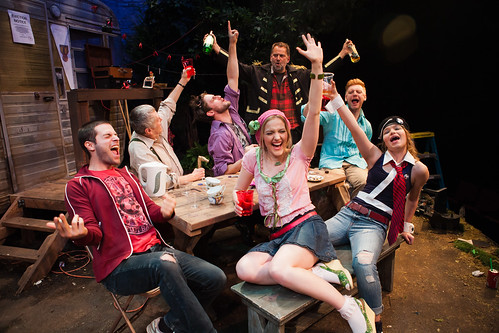Complex Jerusalem unfolds at SF Playhouse
 The cast of San Francisco Playhouse's Jerusalem gets its revel on. Below: Bryan Dykstra (center) is Johnny "Rooster" Byron and Devon Simpson (left) is Pea and Riley Krull is Tanya. Photos by Jessica Palopoli
The cast of San Francisco Playhouse's Jerusalem gets its revel on. Below: Bryan Dykstra (center) is Johnny "Rooster" Byron and Devon Simpson (left) is Pea and Riley Krull is Tanya. Photos by Jessica Palopoli
San Francisco Playhouse deserves tremendous credit for tackling Jez Butterworth's Jerusalem, a multi-award-winning play in London and New York whose success hinged, in large part, on a central performance by Mark Rylance, one of our greatest working actors.
Minus Rylance's dazzle, the rambling, shambling play must stand on its own, and there's not much there there, to paraphrase Gertrude Stein. The SF Playhouse production, directed and designed by Artistic Director Bill English, offers much to admire, including a large, devoted cast that does steadfast, admirable work to keep the audience engaged for three acts that spill out over three hours.
The play, about a drug-dealing former daredevil who lives illegally in a forest camp and surrounds himself with passing generations of lost and misfit teenagers, is certainly interesting and offers pockets of rich, dramatic substance. But for a play where not much happens – the government attempts to evict Johnny, a teenage girl is lost or has run away, an aimless youth attempts to break away from his past – there's a surprising lack of character development. The women, for instance, have very little to do other than tend to the menfolk, look like forest pixies and keep up their part in all the drinking and drugging.
The men get a lot more to do (there are 10 of them and five women), with Brian Dykstra at the top of the heap as the enigmatic Johnny. Dykstra delivers a compelling, multifaceted performance in a role that never fully emerges from the vapors of reality colliding with myth. Is Johnny a despicable drunk who has long sold drugs to teenagers from this dump of a trailer in the Wiltshire woods? Yes, he is. Has he been banned from all the village pubs for reprehensible behavior? Yes, he has. Is he a neglectful father of his young son? Indeed he is. But is there more to Johnny than all of this negative irresponsibility as a so-called adult? Possibly. It could be that Johnny is a descendant of a line of Englishman with rare Romani (Gypsy) blood who have a deep connection to the land and the ability to converse with giants, conjure visions and otherwise connect with the spirit world of ley lines and nearby Stonehenge.
The fact that Johnny harbors this potential depth and power makes his squandered life all the more pathetic, but that seems to be part of Butterworth's point. Here, in the character of Johnny, is England itself, a great, spiritual resource that, like so much of the "civilized" world, has been squandered in the grab for all-powerful gold.
We get all of this by the end of the first act, so there's not much more ground to cover in the second and third acts. We do get a little more back story on some of the other men in Johnny's realm, like Davey (Joshua Schell), who videos everything on his flip phone and is perfectly content to work in the slaughterhouse during the week and drink and drug is paycheck away on the weekends, or Wesley (Christopher Reber), the pub owner in a miserable marriage who needs Johnny's drugs to get through the roughest parts of his day (especially this day in particular when he's stuck dancing with bells on his legs at the village fair).
And then there's Ginger (the magnificent Ian Scott McGregor), who has been with Johnny longer than anyone else and who is still adrift in the world. Ostensibly a DJ, Ginger has brains but is often befuddled by the world and is content to orbit Johnny's ever-changing galaxy of miscreants. McGregor's Ginger offers abundant comic relief, but he's also the play's most heartfelt character, the one you find yourself wishing could find a way onto his own path.
Jerusalem is a hefty piece of work with a large, constantly moving cast and dramatic leaps from the grimy, grotty world of Johnny's camp to the less easily defined realm of pagan transcendence. That's a tall order, and English's production makes as clear a path as it can through Butterworth's thicket of poetry and slang (the program includes a four-page glossary) and exposition. The actors' accents – so often a problem when Americans tackle regional English dialect – are fantastic, so we get a real sense of the rhythms coursing through Butterworth's dialogue.
But in the end, is Jerusalem a cautionary tale or a "sorry, it's too late" tale or simply a reminder that there's more to this life in which we're constantly trying to buy or scrape or narcotize our journey to ever-out-of-reach happiness? There are no easy answers or labels here, and that's actually great. It would be nice, though, to have a clearer dramatic arc and more character depth in the midst of so much everyday hustle bustle and dips into the spirit realm.
[bonus interview]I interviewed Jerusalem playwright Jez Butterworth for the San Francisco Chronicle. Read the story here.
FOR MORE INFORMATION
Jez Butterworth's Jerusalem continues through March 8 at the San Francisco Playhouse, 450 Post St., San Francisco. Tickets are $30-$100. Call 415-677-9596 or visit www.sfplayhouse.org.
